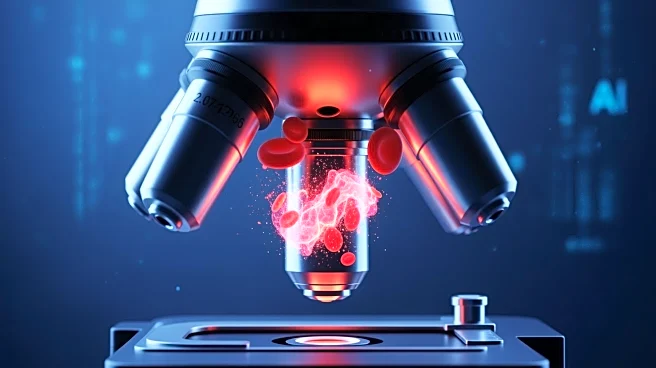What's Happening?
Researchers from the University of Cambridge, University College London, and Queen Mary University of London have developed a generative AI tool named CytoDiffusion, designed to analyze blood cells with
greater accuracy than human experts. This system utilizes generative AI technology, similar to that used in image generators like DALL-E, to study the shape and structure of blood cells. CytoDiffusion can identify a wide range of normal blood cell appearances and detect unusual or rare cells that may indicate diseases such as leukemia. The tool was trained on over half a million images of blood smears, making it robust against differences in hospital equipment and staining methods. In tests, CytoDiffusion demonstrated higher sensitivity in detecting abnormal cells linked to leukemia compared to existing systems, and it can quantify its own uncertainty, a feature that surpasses human capabilities.
Why It's Important?
The development of CytoDiffusion represents a significant advancement in medical diagnostics, particularly for blood disorders. By automating the analysis of blood smears, this AI tool can triage routine cases and flag unusual ones for human review, potentially reducing the workload for clinicians and improving diagnostic accuracy. This could lead to earlier detection of diseases like leukemia, improving patient outcomes. The release of the world's largest publicly available dataset of peripheral blood smear images by the researchers aims to democratize access to high-quality medical data, fostering further innovation in AI-driven diagnostics. The tool's ability to recognize its own limitations and uncertainty enhances its reliability, making it a valuable support system for healthcare professionals.
What's Next?
Further development is needed to increase the speed of CytoDiffusion and test its effectiveness across diverse patient populations to ensure fairness and accuracy. The researchers plan to continue refining the system and exploring its potential applications in other areas of medical diagnostics. The release of the extensive dataset is expected to encourage global research efforts, potentially leading to new AI models that can further improve diagnostic processes. As generative AI continues to evolve, its integration into healthcare systems could transform clinical support systems, offering greater diagnostic and prognostic capabilities.
Beyond the Headlines
The introduction of AI tools like CytoDiffusion raises important ethical and practical considerations in healthcare. While AI can enhance diagnostic accuracy, it is crucial to ensure that these systems are used to complement, rather than replace, human expertise. The ability of AI to recognize its own limitations is a step towards responsible integration into clinical settings. Additionally, the widespread use of AI in healthcare necessitates discussions around data privacy, security, and the potential biases in AI models. As AI becomes more prevalent, healthcare systems must adapt to incorporate these technologies while maintaining patient trust and ensuring equitable access to advanced diagnostic tools.









